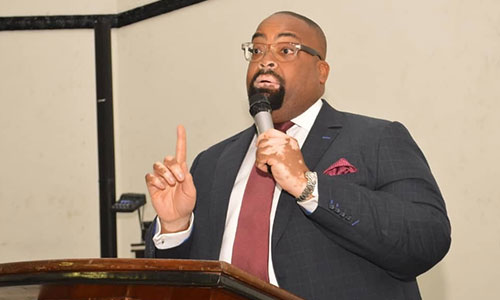'It's better they remain at home' — Lagos parents kick against reopening of schools
Again, we had a bit of good news as regards the education sector this week with the commencement of assessment of Nigerian universities to determine their readiness for resumption by the National Universities Commission. This was in addition to seeing school doors open again early in the week for students in exit classes to enable them to prepare for their external examinations. NUC Executive Secretary, Abubakar Rasheed, had told journalists in Abuja on Tuesday that vice chancellors had been given a template of protocols and strategies for combating the spread of COVID-19. He said that once the necessary guidelines are put in place, universities that are not under the Academic Staff Union of Universities, whose members are currently on strike, could go back to classes. Considering that students have been home for months due to this deadly pandemic, many of them, especially those that have not had access to proper online classes, may be eager to go back to school.
However, amid this euphoria, we need to ask ourselves what and where these students are returning to. Are they going back to the old setting of the Brick-and-Mortar classroom or to a system that fosters e-learning? Even if we had deliberately ignored the obvious fact that learning in the 21st century is a combination of different things, one of which is virtual delivery, COVID-19 has shown us that we can no longer pretend that this method of learning is irrelevant. Agreed, institutions around the world have adopted virtual learning long before now but we have been slow in taking such decision for whatever reason. As far back as a decade ago, there had been robust debates centred around whether or not the brick- and- mortar classrooms would go away just because online education was spreading its wings. But, just like the country is accustomed to doing, Nigeria decided not to be bothered until COVID-19 came and exposed our unpreparedness. Now that our foolishness has been made known to the world, can it still be business as usual?
Looking at the way the Nigerian private institutions quickly embraced e-learning as the new normal in the face of COVID-19, it’s obvious that they are more adaptable to change than their public counterparts. Despite being in the same environment and facing similar challenges, the private institutions have been able to fare better. But, if we agree that refined education should not be limited to private institutions alone, then our public schools will have to step up. Anything short of this will amount to hustling backward. In today’s world, the global relevance of any higher institution is likely to be measured by how fast it can adapt to meeting students’ needs, especially in times of emergencies. That is why urgent steps should be taken to re-engineer the teaching architecture in our institutions for effective delivery.
No doubt, e-learning in Nigeria as it is in other underdeveloped countries, is beset with challenges ranging from lack of human capacity, deficiency and unwillingness to change, poor internet connectivity, epileptic power supply and high cost of data among others. However, in spite of these challenges, I believe we have got to a point where we can no longer justify our tertiary institutions remaining where they were before COVID-19 for any reason. The raw truth is that it is either these institutions adjust to the realities of our times or go into oblivion if not extinction. Of course, that is if we choose to look at things from a global perspective.
A Professor of science and computer education and former Executive Secretary of the National Universities Commission (NUC), Peter Okebukola, has said that Nigeria may have to adopt the concept of a blended Classroom, which means combining the regular face-to-face classroom lectures with the virtual or online mode. One cannot agree less. In today’s world, any tertiary institution that wants to remain relevant and effective will have to pay serious attention to e-learning, otherwise, it would be left behind.
Advertisement
Even if Nigerian public universities are uninterested in being global players, they are likely to lose their relevance locally if they continue to pay lip service to global realities. I know that as it is, it will be difficult if not impossible, for Nigerian public institutions to attract foreign students for several reasons that are topics for another day. But beyond attracting foreign students, these institutions should aim at bringing our education on a par with global standard so that our products could be accorded some modicum of respect, dignity and recognition outside our shores. E-learning in Nigeria should be the new normal post-COVID-19 and our academic staff may have to shore up their profile in this area to further enhance their marketability as well.
There is no better time than this to take a serious look at our digital library project. To have an effective online learning, institutions should have access to digital library resources. To what extent can our digital library support online learning now? The Federal Government should invest in this area.
Similarly, relevant authorities should work towards lowering cost of data, improving power supply and facilitating access to computers and other applications that can boost virtual lectures delivery in our tertiary institutions going forward.
I also think each institution may have to chart their own path in this direction. This idea of Federal Government –owned institutions in particular, depending on government to get everything done is outdated. Institutions should begin to work towards enhancing their values, ratings and acceptance in the global market. This should be the driving force behind their actions.
Advertisement
The University of Ilorin has taken a step that is worthy of emulation in this direction. The university has declared that 70 per cent of its lectures will be done virtually while only 30 per cent will be conducted physically when school resumes academic activities. According to the institution’s Director of Academic Planning, Professor Isaac Abiodun Adimula, the university is planning to conduct its academic activities in such a way that only a minimal number of students will participate in each of its lectures. Already, the vice chancellor, Prof Sulyman Abdulkareem, has released the sum of N168m to provide campus-wide internet so that 75 per cent of the campus could have access to internet receptions. The VC has also approved the training of three members of staff in Italy to ensure the smooth operations of the virtual learning enhancing equipment and systems being erected on the campus. The university says it wants both students and lecturers to effortlessly link up to virtual lectures and practical classes anywhere on campus to prevent the further spread COVID-19.
Interestingly, the University of Ilorin is funded by the Federal Government. I am not sure it got any special grant for this project from government. Yet, the impression we get from our universities is that they cannot do anything except they are funded by government. Never mind the fact that many state universities survive without subventions from their governments. Some people may argue that state institutions charge tuition, which is true, but the amount charged is also little when compared with the cost of accessing higher education in private institutions. Simply put, if UNILORIN, a federal university, could fund a campus-wide internet project on its own, I see no reason why any other federal university shouldn’t be able to do so.
Our tertiary institutions’ administrators should be absolutely committed to this virtual project. School managements should use their internally generated revenues to fund this project while government provides the required assistance for the expansion and development of the facilities in all its schools for effective online delivery. Certainly, face to face learning is a valuable experience, but in today’s technological world, students should be allowed to have more learning opportunities.
Online education is here to stay; any institution that ignores this fact is doing so at its own peril. But for the aberration in Nigeria, where several qualified students struggle to secure admission, tertiary institutions that failed to provide alternative learning platform should be losing students. It is a pity that Nigerian students don’t have much of a choice now!
Advertisement
Olabisi Deji-Folutile is the Editor-in-Chief, Franktalknow.com and member, Nigerian Guild of Editors. Email: [email protected]
Views expressed by contributors are strictly personal and not of TheCable.






